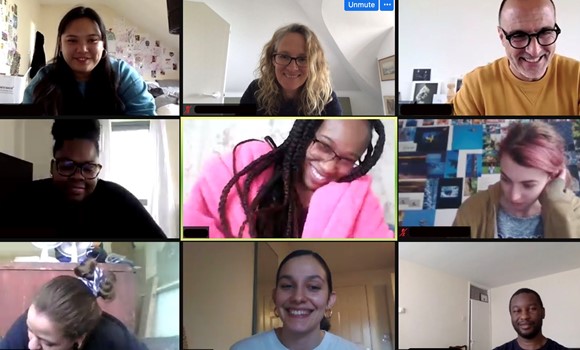
Charity Overview
The Foundling Museum in Bloomsbury, London, is a force for change. Inspired by three great 18th century activists – Thomas Coram, William Hogarth and George Frideric Handel – they believe in creative action that brings past and present together, to stimulate imaginations and enrich young lives. They celebrate the work of artists and inspire people to take positive action that transforms lives and creates a lasting impact.

Project Summary
The Foundling Museum learning programmes have a particular focus on young people in the care system, and include a pioneering training programme for care-experienced young adults, called Tracing Our Tales, which was funded by a donation from ICAP Charity Day in 2019. In addition to paid work in the museum that supports family programmes, the training also boosts trainees’ self-esteem, self-confidence and wellbeing, which helps them return to education, gain apprenticeships and secure employment.
I was very unsure of what I wanted to do in life, so I did the traineeship with the hope that I would gain some work experience. When I started, I was very shy and reserved and I had a lot of anxiety … Over the traineeship I became more confident in myself and positive about speaking to people [and] I met other care leavers who were like me. I became the Artists’ Assistant and helped to run the traineeship for the new trainees. Everyone was really proud of me and it felt great to do something with people who were in my position last year. I would encourage anyone to do this traineeship because of the impact it had on all of us. It was one of the most fun things I have ever done. [They] really made us feel comfortable to be ourselves and treated us like people, without stigma, which is rare. I gained confidence, art skills, work experience, life skills, a sense of my history and friends.Nia, Tracing Our Tales graduate
When the first national pandemic lockdown closed the museum in March 2020, the new cohort of trainees had been with The Foundling for only a matter of weeks. For them and the care-experienced graduates, the isolation of lockdown was intensified by living alone in hostels; having no family support, internet access, or digital equipment; and pay-as-you-go phone contracts. Most trainees have poor mental health, while the graduates draw strength from the friendships and work at the museum. So they knew that they had to find ways to maintain their self-esteem, skills, and sense of community during lockdown, but this was complicated, given that Zoom calls reduced their connectivity to 3G and providing expensive digital kit exposed them to the risk of break-ins. Nevertheless, because care-leavers are so invisible in society, The Foundling Museum wanted people to hear their voices through their lockdown digital programmes.
As part of their training, care-leavers take part in games, designed to build camaraderie and reduce self-consciousness. With training suspended and the museum closed, they decided to adapt these games for families to do in lockdown, using easily accessed, no-cost materials, and shared on social media and online. The trainees spent hours practicing on the phone, before being quickly filmed on Zoom. Creating the films gave them focus and a reminder of happier times, kept their skills alive, and provided a trusted person to talk to on a regular basis. These check-in phone conversations ultimately led to them making a longer film, Isolation Notes, in which they spoke publicly about the impact of Lockdown on care-leavers. They also worked with our volunteers and former pupils of the Foundling Hospital, to create a series of moving films about objects in the museum that are special to them, though a series of artist-led online workshops, called Shared Stories, Shared Voices, have done an Instagram takeover and joined an advisory board, to help shape the museum’s future programming.
Despite Covid, ICAP’s support has not only enabled The Foundling Museum to continue the training programme, but also to expand its reach and increase its impact. To make up for last year’s disruption, they are running two cohorts of trainees in 2021, doubling the number of young adults supported. The first cohort of 14 care-experienced trainees from 9 London boroughs, began their training after Easter and are going great guns.
Given the toll that Covid-19 has had on care-experienced young people’s mental health and self-esteem, this work could not be more vital,


